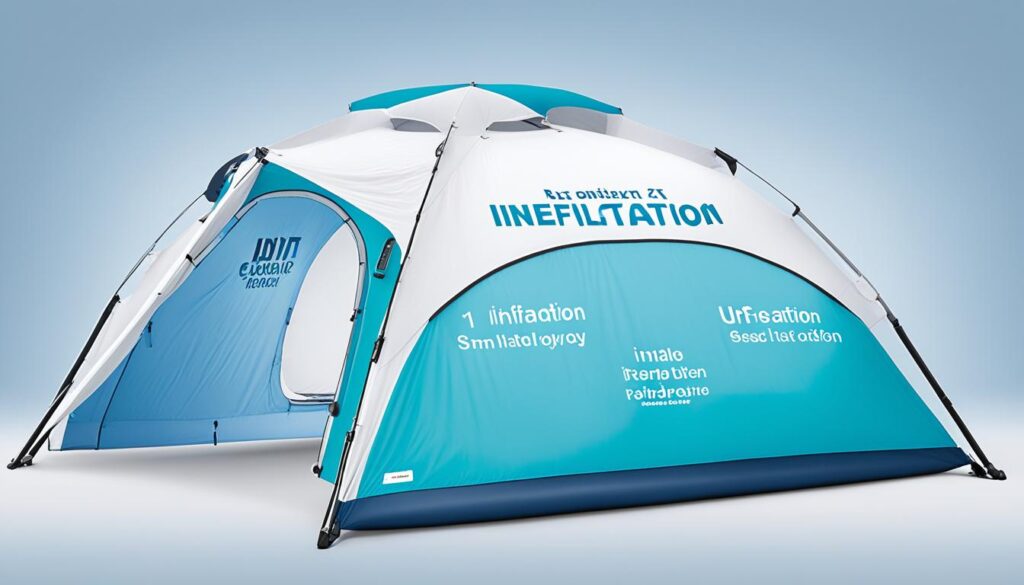
Have you ever wondered how inflatable tents work? It’s time to uncover the fascinating technology behind these innovative outdoor shelters. From their convenient setup to their durability in harsh conditions, inflatable tents have revolutionized the camping experience. But how exactly do they create a strong and sturdy structure? Let’s dive into the world of inflatable tent tech and explore the mechanisms that make them a game-changer for outdoor enthusiasts.
Tube and Sleeve Design
Inflatable tents are constructed using a unique tube and sleeve design, which plays a key role in their overall structure and stability. This innovative construction method ensures a reliable and efficient setup, making inflatable tents a popular choice among outdoor enthusiasts.
The construction process begins with the tubes that form the core of the tent’s structure. These tubes are meticulously tested for leaks in the factory, ensuring their durability and longevity. Once they pass the rigorous quality checks, the tubes are inserted into sleeves to prevent over-expansion and maintain the desired shape of the tent.
The tube and sleeve assembly is then carefully inserted into the tent’s flysheet panels. The flysheet, also known as the outer layer of the tent, provides additional protection against the elements while housing the inflatable beams. Each flysheet panel has a small hole at each beam, allowing for the easy inflation and deflation of the tent.
This intelligent design not only creates a sturdy and robust structure but also allows for quick and hassle-free setup. The use of tubes and sleeves provides optimal support and ensures that the tent maintains its shape and stability even in challenging weather conditions.
Advantages of Tube and Sleeve Design:
- Enhanced stability and structural integrity
- Quick and easy setup
- Ability to withstand different weather conditions
- Durable and long-lasting
With the tube and sleeve design, inflatable tents offer campers a reliable and efficient shelter solution. Whether you’re embarking on a weekend camping trip or a longer outdoor adventure, these tents provide the perfect balance of convenience and durability.
The Air Valve
The air valve plays a critical role in the functionality of inflatable tents. It is through the air valve that the process of inflation and deflation takes place, allowing users to effortlessly set up and take down their tents. There are two main types of air valves commonly used in inflatable tents: the twist valve and the push button valve.
The twist valve is typically found in Vango tents. This valve is designed to be locked closed, requiring users to twist it open in order to inflate the tent. It provides a secure seal that prevents air from escaping, ensuring the tent remains properly inflated during use.
On the other hand, the push button valve is commonly used in other brands of inflatable tents. This valve requires users to push it in and then twist it to initiate the inflation process. Similar to the twist valve, proper closure of the push button valve is essential to maintain the integrity of the tent’s structure.
When it comes to deflating the tent, both types of air valves are opened to release the air. This allows the tent to gradually deflate, making it easier to pack and store.
In summary, the air valve is a crucial component of inflatable tents, enabling the inflation and deflation process. Whether it’s the twist valve or the push button valve, ensuring proper closure of the valve is important for maintaining the tent’s stability and functionality.
Comparison of Twist Valve and Push Button Valve
| Valve Type | Opening Mechanism | Inflation Process | Deflation Process |
|---|---|---|---|
| Twist Valve | Twisting | Twist open to inflate | Open to release air |
| Push Button Valve | Push and twist | Push in and twist to inflate | Open to release air |
Types of Inflation
Inflatable tents come in two variants when it comes to inflation: single inflation point and multiple inflation points. Each option has its own set of advantages and disadvantages, catering to different preferences and needs.
Single Inflation Point
In single inflation point tents, the entire structure can be inflated from just one beam. This design offers a simplified setup process, making it quick and easy to get your tent up and ready. With a single inflation point, you can simply plug in a pump and relax while your tent inflates.
Advantages of single inflation point tents:
- Quick and effortless setup
- Easy inflation from a single point
“Setting up camp has never been easier with single inflation point tents.”
However, there are also some disadvantages to consider:
- May be harder to pitch without a pump
- Takes longer to inflate compared to multiple inflation point tents
Multiple Inflation Points
Multiple inflation point tents require each beam to be inflated separately. While this may take a bit more time and effort, it offers some distinct advantages. With multiple inflation points, you have increased reliability as each beam operates independently. This means that if one tube develops an issue, the others can still provide support, making repairs easier and ensuring the tent remains functional.
Advantages of multiple inflation point tents:
- Increased reliability
- Easier repair if a tube goes wrong
“When it comes to durability, multiple inflation point tents have got you covered.”
However, multiple inflation point tents also have a few drawbacks:
- May require separate pumps or additional effort to inflate each beam
- Can be slower to inflate compared to single inflation point tents
| Type of Inflation | Advantages | Disadvantages |
|---|---|---|
| Single Inflation Point | Quick and effortless setup Easy inflation from a single point | May be harder to pitch without a pump Takes longer to inflate compared to multiple inflation point tents |
| Multiple Inflation Points | Increased reliability Easier repair if a tube goes wrong | May require separate pumps or additional effort to inflate each beam Can be slower to inflate compared to single inflation point tents |

Reliability and Benefits
Inflatable tents offer numerous benefits and are known for their reliability and durability. These innovative outdoor shelters are designed to withstand various weather conditions, making them a dependable choice for camping and backpacking adventures.
One of the key advantages of inflatable tents is their pre-installed structure, which minimizes the risk of user-induced damage. The sturdy air beams used in these tents have impressive wind resistance, often ranging from 45-55mph. This makes them highly reliable even in challenging weather conditions, providing peace of mind for outdoor enthusiasts.
Aside from their reliability, inflatable tents offer several other benefits that make them stand out. The quick and effortless setup process is a major advantage, especially for those who value convenience and efficiency. With no complicated pole assembly, users can save valuable time and energy, allowing them to focus on enjoying their camping experience.
Inflatable tents are also known for their enhanced stability, thanks to the rigid air beams that create a solid framework. This stability ensures that the tent remains sturdy and secure, even during strong winds or heavy rain. Additionally, the generous interior space in inflatable tents provides ample room for sleeping, storage, and other activities. Some models even offer the flexibility to add multiple rooms or partitions, allowing for privacy and organization within the tent.
Another notable benefit of inflatable tents is their lightweight and portable nature. These tents are designed for easy transportation, making them ideal for backpacking trips or any outdoor adventure where mobility is essential. Gone are the days of struggling with heavy and cumbersome tent poles – inflatable tents offer a lightweight alternative without compromising on durability or performance.
Overall, inflatable tents offer a winning combination of reliability, convenience, and practicality. Their durability and the ability to withstand strong winds make them a trusted choice for camping in various environments. With quick setup, enhanced stability, and generous interior space, inflatable tents provide a comfortable and enjoyable shelter for any outdoor enthusiast.

Conclusion
Inflatable tents offer a revolutionary solution for outdoor shelter, providing campers and backpackers with a convenient and efficient camping experience. With their innovative technology and effortless setup, these tents have become increasingly popular among outdoor enthusiasts.
Despite their higher price point compared to traditional tents, the benefits of inflatable tents outweigh the drawbacks. The quick inflation process saves valuable time and energy, allowing campers to start enjoying their outdoor adventures sooner. Furthermore, inflatable tents offer enhanced stability, ensuring a safe and secure shelter even in challenging weather conditions.
Another advantage of inflatable tents is their spacious interiors. These tents provide generous headroom and interior space, allowing campers to move comfortably and store their gear without feeling cramped. Additionally, inflatable tents often offer the option to add multiple rooms or partitions, enhancing privacy and flexibility for larger camping groups.
When considering an inflatable tent, it’s essential to evaluate your specific needs and preferences. The market offers a wide range of options, catering to different camping styles and requirements. Whether you’re a solo backpacker, a family camper, or a group of friends embarking on an outdoor adventure, an inflatable tent can be an excellent choice for your next camping trip.
Source Links
- https://www.linkedin.com/pulse/inflatable-camping-tent-mesa-andhika-kamesywara
- https://www.outdoorworlddirect.co.uk/knowledge/tents/how-do-inflatable-tents-work.html
- https://www.pomoly.com/Inflatable-Tent-Performance-Analysis-Pros-and-Cons-Unveiled-a710029.html

Meet Noah, the soul behind “Best Inflatable Tent” and a true wanderer at heart. Living the van life, Noah has turned his passion for exploring the great outdoors into a lifestyle, earning his living through organizing group travels that bring people closer to nature. With years of firsthand experience in the wild, Noah’s expertise in selecting and utilizing inflatable tents is unparalleled. Through this blog, he shares his profound knowledge and practical tips to help fellow adventurers find their perfect outdoor shelters. Noah’s commitment to delivering genuine, tested insights has made him a trusted authority in the camping community. Join him on this journey to discover the best inflatable tents that make the great outdoors feel like home.